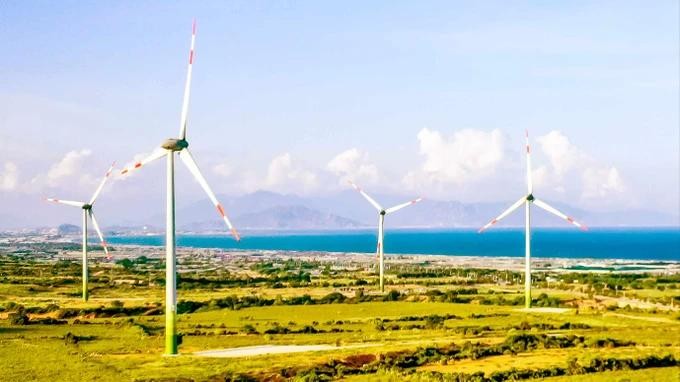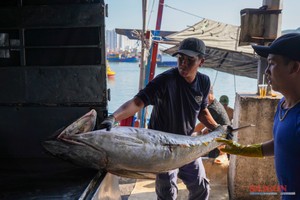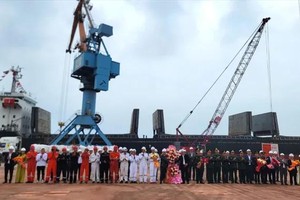
The 2024 Investment Legal Support Forum - Part 2 was held on September 20, focusing on the theme "Attracting Investment for Renewable Energy Projects: Fostering Green Economic Growth in Ho Chi Minh City." This event was jointly organized by the Vietnam International Commercial Arbitration Center (VIAC) and the Ho Chi Minh City Investment and Trade Promotion Center (ITPC).
Addressing the forum, Vice Chairman of the Ho Chi Minh City People's Committee, Vo Van Hoan highlighted the critical role of energy transformation in conjunction with industrial transformation aimed at achieving green and sustainable development which authorities in the southern largest city are taking heed of. Despite notable progress, the city's industrial sector is encountering numerous challenges that necessitate a shift in approach. The success of this industrial transformation hinges on the integration of renewable energy sources.
Numerous investors moaned about some problems when they poured money into the renewable energy sector; all problems are primarily related to legal issues.
Vice President Nguyen Xuan Thang of the European Chamber of Commerce in Vietnam (EuroCham) pointed out that until now, the Ministry of Industry and Trade is still formulating the mechanism to encourage solar power project development in Vietnam. As a result, many solar projects scheduled for implementation post-2020 lack definitive solutions. This uncertainty hampers investors’ confidence and delays the progress of project execution.
Lawyer Nguyen Duc Minh from Kim & Chang Vietnam Law Firm noted that Vietnam lacks a distinct legal framework for renewable energy. Furthermore, the planning for power development is not aligned with other sectoral plans, including those for coal, oil and gas, renewable energy, and transportation.
Additionally, the Feed-in Tariff (FiT) incentive policy, which supported electricity pricing, has ceased for wind and solar power projects that commenced operations after November 1, 2021. This led to investors deciding to temporarily pause their development efforts in the wind and solar sectors.
In the National Assembly’s Resolution 98, lawyer Nguyen Duc Minh proposed that administrations in Ho Chi Minh City promptly release a comprehensive list of projects aiming at attracting specific investments in renewable energy. This list should encompass detailed information, including project specifications, investment formats, criteria for selecting investors, energy requirements, relevant experience, project scale, investment strategies, and incentive policies. Such information must be made publicly available to investors to promote transparency and equity.
Additionally, it is essential to define the electricity connection framework for rooftop solar power systems as well as to implement preferential policies along with targeted investment support. Concurrently, lawyer Le Net, an arbitrator with VIAC, highlighted existing challenges in selling surplus electricity to the Electricity Group (EVN). He noted that the regulations governing the installation of rooftop solar power systems lack specificity, and there is insufficient clarity regarding the direct electricity sale mechanism.
Being Vice President of the Korean Chamber of Commerce in Vietnam (KOCHAM), Mr. Choi Kyu Chul stated that approximately 10,000 Korean companies are currently operational in Vietnam. Many of these factories are interested in implementing rooftop solar power systems; however, they encounter challenges stemming from the existing vague and non-specific regulations.
Deputy Director Nguyen Thi Kim Ngoc of the Ho Chi Minh City Department of Industry and Trade revealed the city's significant energy consumption potential. For instance, by the year 2023, it is projected that Ho Chi Minh City will utilize approximately 28.5 billion kWh, representing 15 percent of the national total.
The southern largest city is particularly well-suited for the development of rooftop solar energy as it is home to skyscrapers, factories, and major public infrastructure.
Furthermore, the NA Resolution 98 permits the installation of rooftop solar power systems on public building premises. Additionally, Ho Chi Minh City has requested guidance from the Ministry of Industry and Trade regarding the procedural framework for exploring two offshore wind power projects in the Can Gio district, which would have a combined capacity of 8,000 MW.
Vice President Seck Yee Chung of the Singapore Business Association in Vietnam talked about the interest of foreign investors in Vietnam's renewable energy sector. However, he noted that these investors encounter significant obstacles, particularly regarding limited access to financing for their projects. To address this issue, it is essential to revise policy frameworks and standard contracts to better accommodate investors.
Mr. Seck Yee Chung emphasized that in order to draw investment into the renewable energy field, it is crucial to ensure that planning, land preparation, bidding transparency, and support policies, as well as project approval and licensing processes, are well-defined and clear.
Worse, Lawyer Nguyen Quoc Vinh, an arbitrator with VIAC, recently reported that three significant investors in the green energy sector have left Vietnam. This underscores the necessity for policy stability to retain investors. He emphasized that renewable energy projects in Vietnam encounter numerous risks related to policy consistency, construction, operation, and revenue generation.
According to him, the government must share with investors to mitigate these risks. It is essential to establish stable policies that allow investors to foresee potential challenges.
























